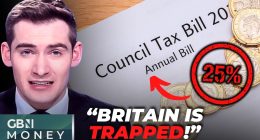Government Considers Major Council Tax Reforms – Here’s What Could Change
Council tax is one of the biggest household expenses in England, with the average Band D property paying over £200 per month. But new government proposals could make bills more manageable for struggling households.
A new consultation has been launched to reform how council tax is billed and collected, with potential changes including spreading payments over 12 months instead of 10.
Below, we break down the four key proposals and explain what financial support is available if you’re finding council tax unaffordable.
1. 12 Monthly Payments (Instead of 10) – Easier Budgeting
Currently, most councils spread payments over 10 months, leaving two months (February and March) bill-free but making other months more expensive.
Proposed Change:
-
Default 12-month payment plans to smooth out costs and prevent financial strain.
-
Could reduce monthly payments by 15-20% for many households.
Who Benefits?
✔ Low-income families struggling with lump sums.
✔ Households on tight budgets who need predictable monthly expenses.
2. More Flexible Payment Options
Some councils already allow 12-month payments, but the government wants to standardise flexibility across England.
Proposed Change:
-
All councils must offer 12-month instalments by default.
-
Easier switching between payment plans.
Who Benefits?
✔ Those with irregular incomes (e.g., freelancers, seasonal workers).
✔ People who prefer smaller, consistent payments.
3. Better Support for Struggling Households
Many don’t realise they’re eligible for council tax reductions – reforms could make discounts easier to access.
Proposed Change:
-
Clearer guidance on council tax support schemes.
-
Automatic discounts for eligible claimants (e.g., pensioners, low earners).
Current Discounts Available:
-
Single Person Discount (25% off) – If you live alone.
-
Council Tax Reduction (up to 100% off) – For low-income households.
-
Disabled Band Reduction – If a disabled person lives in the home.
4. Fairer Debt Collection Rules
Council tax arrears can lead to court summons, bailiffs, or even prison (in extreme cases). The government wants fairer enforcement.
Proposed Change:
-
Stricter rules on bailiff action.
-
More repayment options before legal action.
What to Do If You Can’t Pay?
✅ Contact your council immediately – They may adjust payments.
✅ Check if you qualify for discounts (e.g., Universal Credit claimants).
✅ Ask for a hardship fund – Some councils offer emergency support.
How to Have Your Say in the Consultation
The government is seeking public feedback until [consultation deadline].
How to Respond:
-
Visit the official consultation page [Insert Link].
-
Share your views on the proposed changes.
-
Push for fairer council tax rules if you support reforms.
Final Verdict: Will These Changes Help?
✔ 12-month payments = Easier budgeting for households.
✔ More flexible options = Better financial control.
✔ Stronger support = Fewer people falling into debt.
Do you think these changes will make council tax fairer? Share your thoughts below!









